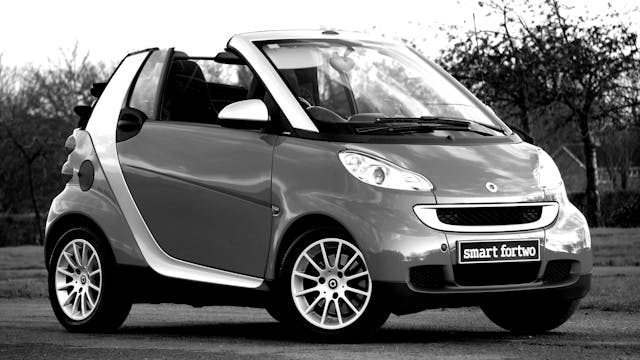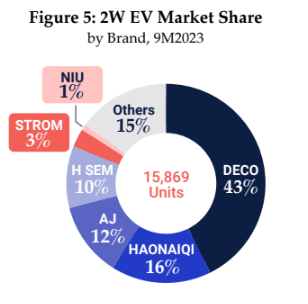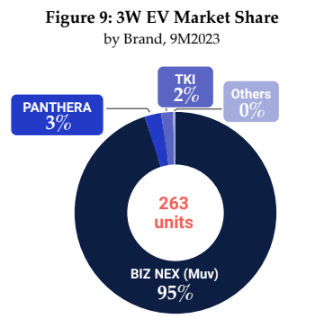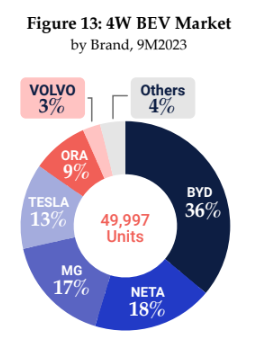

Thailand's electric vehicle (EV) ecosystem is undergoing rapid development, marked by diverse segments experiencing substantial growth and dynamic market shifts. The positive performance of EV segments in Thailand is expected to shape the future of transportation in the country.

Image Source: YCP White Paper
One of the notable segments is electric two-wheelers (E2W), where electric motorcycles have demonstrated significant expansion despite representing a fraction of the overall motorcycle market. The E2W market witnessed an impressive compound annual growth rate (CAGR) of 150% from 2020 to 2022, with a further 60% increase by September 2023. This growth is propelled by local players who have invested in their production and assembly facilities. Initiatives such as 7-Eleven's adoption of electric scooters for cost savings and environmental benefits have further stimulated market growth.
However, substantial scaling of EV battery production is essential to achieve the ambitious targets outlined in the government's 30@30 EV roadmap. Thailand's government aims to produce 675,000 electric two-wheelers (E2Ws) annually by 2030, necessitating a significant increase in EV battery production. Currently, EV motorcycle batteries in Thailand combine locally manufactured and imported batteries. Major manufacturers like GPX and Thai Yamaha Motor produce batteries, while others import from China. There's a growing interest among brands to expand operations and localize battery production in Thailand, encouraged by government incentives like tax breaks.

Image Source: YCP White Paper
In addition to two-wheelers, Thailand's electric three-wheeler (E3W) market is gaining momentum, especially in the iconic tuk-tuk segment. Initiatives like MuvMi, an all-electric tuk-tuk ride-hailing service, have contributed to a significant 49% increase in electric 3W adoption from 2022 to September 2023. Collaborations between MuvMi and companies like Biz Next Motor Company aim to expand the electric tuk-tuk fleet significantly. However, streamlined registration processes are critical for broader market penetration beyond urban hubs like Bangkok.

Image Source: YCP White Paper
Thailand's electric four-wheeler (E4W) passenger vehicle market is also experiencing rapid expansion, with a remarkable 400% growth in battery electric vehicle (BEV) passenger car sales as of 9M2023. Thailand also has seen a surge in registered 4W EVs, with nearly 49,997 new BEV passenger car sales in 2023, marking a 400% growth in 9 months. Total sales for 2023 are projected to exceed 50,000 units, reflecting the country's positive sentiment towards electric vehicles. Chinese BEV brands dominate this segment, capturing over 70% market share in 2023, driven by robust demand and supportive government policies. Thailand's strategic investments in EV components, particularly batteries, bolster its competitiveness in the global BEV market.
Furthermore, the electric large commercial vehicle segment is witnessing significant growth, encompassing buses and trucks. Electric bus registrations increased by 17%, while electric truck registrations surged by an impressive 920% from 2022 to 9M2023. Thailand EV brands such as Nex and Mine lead this market, supported by government initiatives promoting greener transportation. However, challenges such as payload versus range concerns and the availability of charging infrastructure continue to impede the widespread adoption of electric trucks.
While specific market share figures may vary by segment, Thailand's EV market is experiencing significant growth and diversification, driven by domestic demand and government initiatives promoting sustainable transportation.
Source: https://ycpsolidiance.com/white-paper/electric-vehicle-powerhouse-thailand-sea

Exploring the Digital Health Competitive Landscape in Thailand
Thailand has experienced significant growth in its digital health market, propelled by the government's push towards digital transformation and the rising adoption of health technologies. The market encompasses a range of digital health solutions, including telemedicine, electronic health records (EHR), mobile health apps (mHealth), and wearable technologies. These conditions create a digital health competitive landscape in Thailand.

Global Changes in Technology Roles in Companies
The global changes in technology roles are reshaping business operations and strategies. We explore these changes in this article.

ASEAN EV Market: Expanding Production in Thailand
Electric vehicle (EV) adoption in Southeast Asia has gained momentum in recent years, albeit slower than in other regions like Europe and China. Indonesia boasts the largest nickel deposits globally, while Vietnam's abundant nickel reserves make it ideal for battery production. Thailand, the region's largest producer and market for EVs, offers incentives to position itself as a base for EV manufacturing. These factors provide good provisions for the ASEAN EV industry.

Lubricants Market Overview in Southeast Asia: Navigating Growth and Trends
Southeast Asia’s lubricant market is poised for significant growth, fueled by industrialization, infrastructure projects, and evolving consumer preferences.